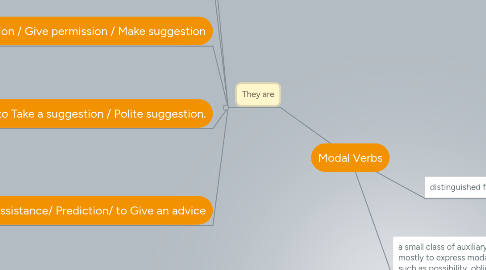
1. They are
1.1. Must
1.1.1. Necessity / Obligation Prohibition
1.1.1.1. We must say good-bye now. They mustn’t disrupt the work more than necessary.
1.2. Will
1.2.1. Instant decisions Offer Promise Certain prediction
1.2.1.1. I can’t see any taxis so I’ll walk. I'll do that for you if you like. I’ll get back to you first thing on Monday. Profits will increase next year.
1.3. Possibility / Impossibility /Ask permission / Give permission / Make suggestion
1.3.1. Can
1.3.1.1. -Ability / Possibility Inability / Impossibility -Asking for permission -Request
1.3.1.1.1. -They can control their own budgets. -We can’t fix it. -Can I smoke here? -Can you help me?
1.3.2. Could
1.3.2.1. Asking for permission. Request Suggestion Future possibility Ability in the past
1.3.2.1.1. Could I borrow your dictionary? Could you say it again more slowly? We could try to fix it ourselves. I think we could have another Gulf War. He gave up his old job so he could work for us.
1.3.3. Would
1.3.3.1. Asking for permission Request Request Making arrangements Invitation Preferences
1.3.3.1.1. Would you mind if I brought a colleague with me? Would you pass the salt please? Would you mind waiting a moment? "Would three o`clock suit you?" - "That’d be fine." Would you like to play golf this Friday? "Would you prefer tea or coffee?" - "I’d like tea please."
1.4. Formal permission / Formal prohibition / Polite request / possibility / negative possibility /to Take a suggestion / Polite suggestion.
1.4.1. May
1.4.1.1. Asking for permission Future possibility
1.4.1.1.1. May I have another cup of coffee? China may become a major economic power.
1.4.2. Might
1.4.2.1. Present possibility Future possibility
1.4.2.1.1. We'd better phone tomorrow, they might be eating their dinner now. They might give us a 10% discount.
1.5. Offer of Assistance/ Offer of Assistance/ Prediction/ to Give an advice
1.5.1. Should
1.5.1.1. Saying what’s right or correct Recommending action Uncertain prediction
1.5.1.1.1. We should sort out this problem at once. I think we should check everything again. Profits should increase next year.
1.5.2. Shall (More common in the UK than the US)
1.5.2.1. Offer Suggestion Asking what to do
1.5.2.1.1. Shall I help you with your luggage? Shall we say 2.30 then? Shall I do that or will you?
1.5.3. Ought to
1.5.3.1. Saying what’s right or correct
1.5.3.1.1. We ought to employ a professional writer.
